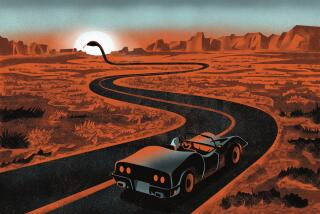‘Tobacco Road’ at La Jolla Playhouse
WHEN “Tobacco Road” premiered on Broadway in 1933, it pushed the envelope with its unsavory depiction of rural poverty. Would theatergoers looking for a fun night out want to have their noses rubbed in the degrading conditions of destitute Georgia sharecroppers? As it turned out, the middle class had a real appetite for this sort of filthy fingernail naturalism.
Seventy-five years later, “Tobacco Road” remains the second longest-running drama in Broadway history. But those who attend the La Jolla Playhouse revival, which opened Sunday under the direction of David Schweizer, are likely to understand why the play (relic is more like it) has rarely been revived since the 1950s.
Adapted by Jack Kirkland from Erskine Caldwell’s classic novel, “Tobacco Road” no longer packs the same punch with its warts-and-all realism. In fact, it hardly seems realistic at all. What once lent a scandalous impression of documentary fragments now has an overriding quality of comic caricature -- think “Married With Children” or “Mama’s Family” transposed to a dirt-road shanty.
Perhaps following in the footsteps of John Ford’s 1941 film version, Schweizer’s production treats the work like a Depression-era cartoon. We’re invited to gawk at the characters’ squalid behavior but not encouraged to ask too many questions about the forces that shaped their miserable lives.
Squatting in a ramshackle house on farmland that was previously family-owned, Jeeter Lester (John Fleck) and his worn-out wife, Ada (Jan Leslie Harding), are models of parental depravity. They pass the day nostalgically musing about old vices, squabbling with their unruly children and fighting over a bag of turnips like hungry vermin.
Dude (Sam Rosen), their ricocheting 16-year-old bullet of a son, bounces a ball ritualistically against the house, threatens to beat up his decrepit grandma (Lucy Ann Albert) and taunts his father by saying he’s going to bury him where the rats can gnaw his face off. Barefoot and wearing overalls without a shirt, he’s an overgrown wild child who catches the lusty attention of Sister Bessie (Catherine Curtin), an itinerant preacher with a full figure and a temptingly fat insurance check, which has cheerfully come with widowhood.
Two unlucky daughters are included in this saga. Ellie May (Kate Dalton) has a disfigured lip that has made her impossible to unload on a husband; she’s also a numskull who jumps on men like a dog in heat.
Pearl (Mary Deaton), the dainty beauty, has been married off to Lov Bensey (Chris Reed), an obese dolt who can’t get his new bride to sleep with him. Ada would rather see her pride and joy strolling around the shops in Augusta, but Jeeter isn’t about to let Pearl renege on his deal.
When stomachs are empty, nothing apparently is sacred. If a daughter can fetch a fair price on the marital market, who’s to say no? And there’s no incentive to curbing licentious impulses when animal pleasures are the only ones anyone can afford.
With a plot fueled by a credit crisis (Jeeter needs a loan to revive the farm) and the looming eviction of the Lesters, it’s easy to see what drew La Jolla Playhouse to resurrect this forgotten drama. But Schweizer can’t figure out how to reanimate the play.
The production leaps from comedy to drama to an expressionism in which the wooden planks of David Zinn’s set start coming undone as Shahrokh Yadegari’s soundscape rumbles. But all it really adds up to is historical tourism -- postcards from an earlier financial free-fall.
When Kirkland’s adaptation was originally produced, Harold Clurman complained in his Daily Worker review that it “lacks a point of view and seems to address itself to nobody in particular.” More sensational than reflective, “Tobacco Road” attempts to cover up its intellectual deficiencies with a theatricality that’s about as subtle as a mouthful of chaw.
Schweizer’s cast strives for vividness but doesn’t always manage to seem united as an ensemble. Accents wobble, and an acute sense of place, so crucial to a work about a jeopardized family homestead, is often missing.
As the patriarch who throws away his decency as everything else is taken from him, Fleck has just the right agile stage presence to handle the role’s slippery demands. Too bad that he’s forced to contend with clumsy lighting that italicizes his monologues in a manner that never seems meaningfully integrated.
When Jeeter lets a handful of dirt fall climactically from his clutches, the gesture is meant to symbolize the loss that results from a raw deal compounded by bungled opportunities. But you can be forgiven if all you experience is the relief that our own roller-coaster recession isn’t half so heavy-handed.
“Tobacco Road,” La Jolla Playhouse, Mandell Weiss Forum Theatre, 2910 La Jolla Village Drive, La Jolla. 7:30 p.m. Tuesdays and Wednesdays, 8 p.m. Thursdays and Fridays, 2 and 8 p.m. Saturdays, 2 and 7 p.m. Sundays. Ends Oct. 26. $36 to $62. (858) 550-1010 or www.lajollaplayhouse.org. Running time: 2 hours, 15 minutes.
More to Read
The biggest entertainment stories
Get our big stories about Hollywood, film, television, music, arts, culture and more right in your inbox as soon as they publish.
You may occasionally receive promotional content from the Los Angeles Times.







